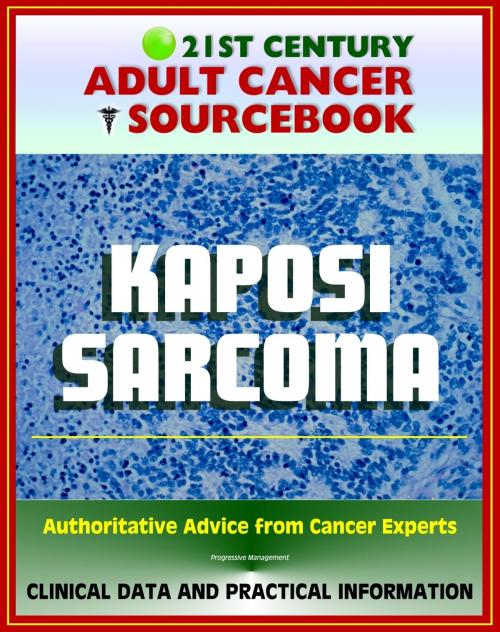21st Century Adult Cancer Sourcebook: Kaposi Sarcoma - Clinical Data for Patients, Families, and Physicians
Nonfiction, Health & Well Being, Health, Ailments & Diseases, Cancer| Author: | Progressive Management | ISBN: | 9781466111547 |
| Publisher: | Progressive Management | Publication: | October 12, 2011 |
| Imprint: | Smashwords Edition | Language: | English |
| Author: | Progressive Management |
| ISBN: | 9781466111547 |
| Publisher: | Progressive Management |
| Publication: | October 12, 2011 |
| Imprint: | Smashwords Edition |
| Language: | English |
Authoritative information and practical advice from the nation's cancer experts about Kaposi Sarcoma includes official medical data on signs, symptoms, early detection, diagnostic testing, risk factors and prevention, treatment options, surgery, radiation, drugs, chemotherapy, staging, biology, prognosis, and survival, with a complete glossary of technical medical terms and current references.
Starting with the basics, and advancing to detailed patient-oriented and physician-quality information, this comprehensive in-depth compilation gives empowered patients, families, caregivers, nurses, and physicians the knowledge they need to understand the diagnosis and treatment of Kaposi Sarcoma
Comprehensive data on clinical trials is included - with information on intervention, sponsor, gender, age group, trial phase, number of enrolled patients, funding source, study type, study design, NCT identification number and other IDs, first received date, start date, completion date, primary completion date, last updated date, last verified date, associated acronym, and outcome measures.
Kaposi sarcoma is a disease in which malignant (cancer) cells form in the tissue lining the lymph vessels under the skin or in mucous membranes.
Kaposi sarcoma is a cancer that causes lesions (abnormal tissue) to grow under the skin, in the lining of the mouth, nose, and throat, or in other organs. The lesions are usually purple and are made of cancer cells, new blood vessels, and white blood cells. Kaposi sarcoma is different from other cancers in that lesions may begin in more than one place in the body at the same time.
Human herpesvirus-8 (HHV-8) is found in the lesions of all patients with Kaposi sarcoma. This virus is also called Kaposi sarcoma herpes virus (KSHV). Most people infected with HHV-8 do not get Kaposi sarcoma. Those infected with HHV-8 who are most likely to develop Kaposi sarcoma have immune systems weakened by disease or by drugs given after an organ transplant.
Extensive supplements, with chapters gathered from our Cancer Toolkit series and other reports, cover a broad range of cancer topics useful to cancer patients. This edition includes our exclusive Guide to Leading Medical Websites with updated links to 81 of the best sites for medical information, which let you quickly check for updates from the government and the best commercial portals, news sites, reference/textbook/non-commercial portals, and health organizations. Supplemental coverage includes:
Levels of Evidence for Cancer Treatment Studies
Glossary of Clinical Trial Terms
Clinical Trials Background Information and In-Depth Program
Clinical Trials at NIH
How To Find A Cancer Treatment Trial: A Ten-Step Guide
Taking Part in Cancer Treatment Research Studies
Access to Investigational Drugs
Clinical Trials Conducted by the National Cancer Institute's Center for Cancer Research at the National Institutes of Health Clinical Center
Taking Time: Support for People with Cancer
Facing Forward - Life After Cancer Treatment
Chemotherapy and You
Authoritative information and practical advice from the nation's cancer experts about Kaposi Sarcoma includes official medical data on signs, symptoms, early detection, diagnostic testing, risk factors and prevention, treatment options, surgery, radiation, drugs, chemotherapy, staging, biology, prognosis, and survival, with a complete glossary of technical medical terms and current references.
Starting with the basics, and advancing to detailed patient-oriented and physician-quality information, this comprehensive in-depth compilation gives empowered patients, families, caregivers, nurses, and physicians the knowledge they need to understand the diagnosis and treatment of Kaposi Sarcoma
Comprehensive data on clinical trials is included - with information on intervention, sponsor, gender, age group, trial phase, number of enrolled patients, funding source, study type, study design, NCT identification number and other IDs, first received date, start date, completion date, primary completion date, last updated date, last verified date, associated acronym, and outcome measures.
Kaposi sarcoma is a disease in which malignant (cancer) cells form in the tissue lining the lymph vessels under the skin or in mucous membranes.
Kaposi sarcoma is a cancer that causes lesions (abnormal tissue) to grow under the skin, in the lining of the mouth, nose, and throat, or in other organs. The lesions are usually purple and are made of cancer cells, new blood vessels, and white blood cells. Kaposi sarcoma is different from other cancers in that lesions may begin in more than one place in the body at the same time.
Human herpesvirus-8 (HHV-8) is found in the lesions of all patients with Kaposi sarcoma. This virus is also called Kaposi sarcoma herpes virus (KSHV). Most people infected with HHV-8 do not get Kaposi sarcoma. Those infected with HHV-8 who are most likely to develop Kaposi sarcoma have immune systems weakened by disease or by drugs given after an organ transplant.
Extensive supplements, with chapters gathered from our Cancer Toolkit series and other reports, cover a broad range of cancer topics useful to cancer patients. This edition includes our exclusive Guide to Leading Medical Websites with updated links to 81 of the best sites for medical information, which let you quickly check for updates from the government and the best commercial portals, news sites, reference/textbook/non-commercial portals, and health organizations. Supplemental coverage includes:
Levels of Evidence for Cancer Treatment Studies
Glossary of Clinical Trial Terms
Clinical Trials Background Information and In-Depth Program
Clinical Trials at NIH
How To Find A Cancer Treatment Trial: A Ten-Step Guide
Taking Part in Cancer Treatment Research Studies
Access to Investigational Drugs
Clinical Trials Conducted by the National Cancer Institute's Center for Cancer Research at the National Institutes of Health Clinical Center
Taking Time: Support for People with Cancer
Facing Forward - Life After Cancer Treatment
Chemotherapy and You















